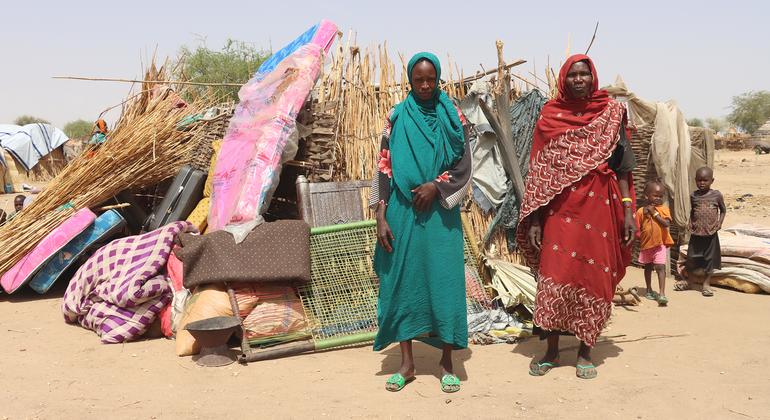Speaking at a press briefing at the United Nations in Geneva, IOM’s spokesperson Paul Dillon said that according to IOM’s Displacement Tracking Matrix, more than 700,000 people were now internally displaced by the fighting, which began on 15 April.
The number of IDPs increased in many areas, including the capital, where clashes were continuing, he said: “Last Tuesday, the figure stood at 340,000. And, of course, prior to the fighting, an estimated 3.7 million people were internally displaced in Sudan.”
Fleeing in many directions
Responding to a question about where internally displaced persons were heading, Mr. Dillon said the data was currently preliminary and being analysed. They were moving into multiple states, including White Nile and Khartoum.
Decisions to move were influenced by many different factors, including whether there was conflict in any given area. However, it was difficult for the people to find money, with cash distribution stalled, and the banking system, in effect, shut down.
Fuel is also difficult to come by and expensive, according to IOM.
Deliveries thwarted
“The IOM has stocks of non-food items in six warehouses around the country,” said the IOM spokesperson. “But to date, we have been unable to deliver to those in need.
“The fighting must end and humanitarians must be allowed to resume their work, providing assistance to those most in need before the situation spirals further out of control.”
Secretary-General António Guterres on Monday condemned looting at the main compound of the UN World Food Programme (WFP) in Khartoum over the weekend. This was the latest targeting of humanitarian facilities since the start of the crisis, now into its fourth week. Most, if not all UN agencies and humanitarian partners, have been impacted by large-scale looting.
Information vacuum
“At this point, we don’t have any information, we aren’t even able to confirm the extent of the looting in the Khartoum office, but reiterate that the food, the vehicles, the fuel, the assets that have been looted from WFP, go towards the response for the people in Sudan. And this directly hurts the people of Sudan,” said Isheeta Sumra, WFP’s Communications Officer speaking from the agency’s headquarters in Rome.
The UN World Health Organization (WHO) also reported attacks and looting of healthcare facilities in Sudan.
“Since 15 April, WHO has verified 28 attacks on health, leading to eight deaths and 18 injuries. More reports are under verification,” said WHO spokesperson Tarik Jašarević.
“These attacks include looting, obstruction of access to healthcare, violent attacks using weapons and the forced occupation of facilities. Unfortunately, the looting is affecting healthcare facilities. And this is something that severely undermines the possibility of Sudanese people to seek healthcare.”
At the same briefing, the WHO said 604 people had been killed and more than 5,000 injured since the violence erupted in mid-April between the rival armed factions, although the UN has repeatedly said the figures are likely to be an underestimate.



